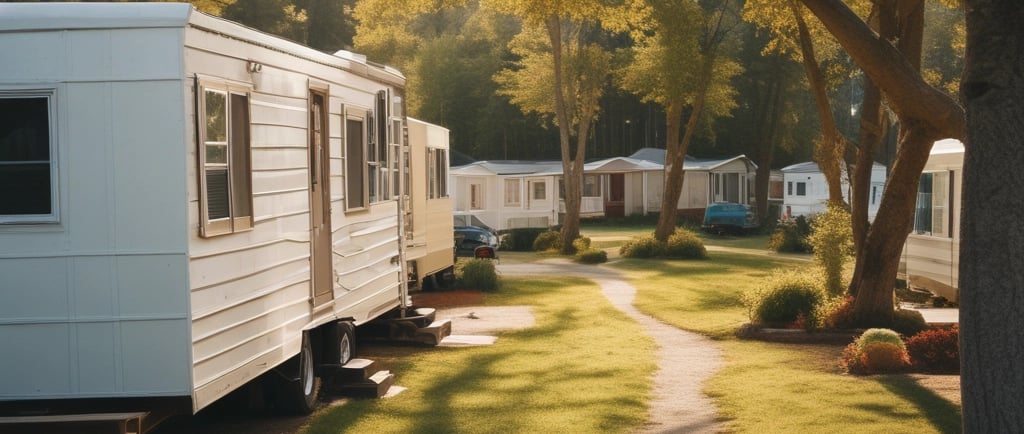The Pros and Cons of Mobile Home Ownership
10/16/20257 min read


Introduction to Mobile Home Ownership
Mobile home ownership has emerged as a viable option for many individuals and families seeking affordable housing solutions. A mobile home, often referred to as a manufactured home, is a residential structure that is built on a chassis and designed to be transported from one location to another. Unlike traditional homes, which are typically constructed on a fixed foundation, mobile homes are constructed in a factory and may be moved to various sites, offering increased flexibility for homeowners.
The distinction between mobile homes and conventional houses extends beyond their structural differences. Mobile homes are generally more cost-effective than site-built homes, making them an appealing choice for those who want to enter the housing market without incurring substantial debt. With the rising costs of housing in many regions, the appeal of mobile homes has grown significantly. These dwellings can provide necessary accommodations for lower-income families, retirees, and individuals looking for simpler living arrangements.
As interest in mobile home ownership continues to rise, it is essential to understand the various benefits and potential drawbacks associated with this lifestyle. Mobile homes can provide an affordable alternative to traditional housing, but they may also come with challenges, such as land leasing arrangements, zoning regulations, and maintenance responsibilities. Prospective buyers should carefully consider their priorities and long-term plans when evaluating mobile homes as a housing solution. An informed decision can help homeowners enjoy the advantages of mobile home living while navigating any challenges that may arise.
Pros of Mobile Home Ownership
Mobile home ownership offers several advantages that appeal to a diverse range of individuals and families. One of the most significant factors is affordability. Mobile homes typically cost less than traditional homes, making them an attractive option for first-time buyers or those on a tight budget. According to the U.S. Census Bureau, the average price of a mobile home is considerably lower than that of a site-built home, which provides an accessible entry point for homeownership.
Furthermore, mobile homes afford owners a degree of flexibility and mobility that is not commonly found in traditional housing. This adaptability allows families to relocate their homes without the burdensome processes associated with selling and buying property. For instance, a family may choose to move to a different location for job opportunities or lifestyle changes while bringing their home with them, significantly reducing the stress and logistical challenges of relocating.
Maintenance is another area where mobile home ownership shines. Generally, mobile homes incur lower maintenance costs compared to their traditional counterparts, as they often require fewer repairs and renovations. This is largely due to the simpler structure and design of mobile homes. Homeowners can save money and time, focusing on enjoying their living environment rather than being burdened by constant upkeep.
Community living is yet another benefit associated with mobile home ownership. Many mobile home parks foster a sense of community among residents, promoting social connections and support systems that might be missing in more conventional neighborhoods. These parks often host events and activities that encourage interaction and camaraderie, enriching the experience of mobile home living.
In light of these factors, it becomes apparent that mobile home ownership presents numerous benefits which can enhance the quality of life for individuals seeking affordable, flexible, and community-oriented housing solutions.
Cons of Mobile Home Ownership
While mobile home ownership can offer various benefits, it is crucial to also consider certain drawbacks that potential homeowners may face. One significant concern is the depreciation in value. Unlike traditional homes that often appreciate over time, mobile homes generally lose value more quickly. This depreciation can be attributed to various factors, including the age of the home, maintenance issues, and market demand. Consequently, mobile home owners may find it challenging to recoup their initial investment should they choose to sell in the future.
Another important consideration is zoning restrictions, which can impact mobile home ownership. Many areas have specific regulations that dictate where mobile homes can be situated, potentially limiting homeowners’ options for location. These restrictions may involve minimum lot sizes, setbacks from property lines, and other land use regulations. Owners must ensure they understand local zoning laws before purchasing a mobile home, as failing to do so can lead to complications and financial repercussions.
Financing options for mobile homes can also be more limited compared to traditional homes. Lenders typically view mobile homes as personal property rather than real estate, making it harder to secure a mortgage. As a result, mobile home buyers may face higher interest rates or stricter lending requirements, which can ultimately increase their long-term costs. This difficulty in obtaining financing may deter some potential buyers from pursuing a mobile home as a viable housing option.
Lastly, there is a possibility of lower quality construction in some mobile homes. While there are certainly high-quality options available, certain models may not meet the same standards of durability and craftsmanship as traditional houses. Owners should conduct rigorous inspections to ensure their mobile home is built to last, as roofs, plumbing, and insulation quality can vary significantly. Awareness of these potential downsides can empower buyers to make informed decisions about mobile home ownership.
Financial Considerations
Mobile home ownership presents unique financial implications that potential buyers should carefully consider. One of the primary factors is the initial purchase price, which is generally lower than that of traditional homes. However, buyers should also be aware that mobile homes may depreciate in value over time, similarly to vehicles. This depreciation can significantly affect the resale value, prompting owners to think critically about their long-term investment.
In addition to the purchase price, there are ongoing expenses associated with mobile home ownership. These costs typically include utilities such as water, electricity, and gas, which can fluctuate based on usage and local rates. Furthermore, many mobile home owners rent the land upon which their homes sit. Land rental fees can vary widely depending on location and amenities, so it is prudent for buyers to account for these recurring costs in their overall budgeting.
Insurance is another crucial aspect of financial planning for mobile home owners. Standard homeowner's insurance may not adequately cover mobile homes, necessitating specialized mobile home insurance, which can lead to increased monthly expenses. This insurance typically covers aspects like property damage and liability, thus offering essential protection for the homeowner.
When navigating these financial considerations, potential buyers should conduct thorough research and speak with financial advisors to create a comprehensive budget. It is advisable to explore various financing options, including personal loans and financing offered through manufacturers or dealers. Understanding the complete financial landscape allows buyers to make informed decisions regarding their investment in mobile home ownership, ultimately leading to a more sustainable and fulfilling living experience.
Legal and Zoning Issues
Mobile home ownership brings with it a distinct set of legal and zoning intricacies that potential owners must navigate. A fundamental consideration is whether to lease land or own it. Many mobile home owners choose to place their homes in a mobile home park where they rent the space. This situation can be beneficial due to lower upfront costs and maintenance responsibilities; however, it often places owners at the mercy of the park's rules and regulations. Understanding these stipulations is crucial, as they dictate various aspects of park living, from alterations to the mobile home to potential eviction procedures.
Land ownership presents another pathway for mobile home placement. Owning land provides increased autonomy and the ability to modify one's property without external restrictions. However, this option involves additional costs, including property taxes, insurance, and maintenance, which can affect overall budget considerations. Each choice comes with its own legal obligations, potentially complicating the ownership experience.
Local regulations also significantly affect where and how a mobile home can be placed. Zoning laws, which vary from one locality to another, can restrict mobile home installations in certain areas or impose size limitations. Additionally, some municipalities might require permits before a mobile home can be moved onto a property. It is imperative for prospective mobile home owners to consult their local zoning office or community planning department to understand any regulations applicable to their desired location.
In mobile home communities, park rules are essential legal documents that outline rights and responsibilities for residents. These rules may govern everything from aesthetic guidelines to the enforcement of quiet hours. Therefore, prospective owners should examine these rules closely and ensure they can abide by them. As mobile home ownership continues to rise, being well-versed in the legal and zoning issues surrounding such living arrangements has never been more significant.
Lifestyle Considerations
Owning a mobile home can significantly impact one's lifestyle, influenced by various factors including community dynamics, living environment, and social engagements. Typically, mobile homes are situated in communities that foster a unique sense of belonging among residents. The communal atmosphere can lead to strong social ties, as neighbors often share similar lifestyles and interests. This close-knit environment can enhance feelings of security and support, making it an appealing option for individuals or families seeking a vibrant community life.
Moreover, the benefits of a simpler lifestyle are often associated with mobile home living. For many, downsizing to a mobile home signifies a move towards minimalism, encouraging individuals to prioritize experiences over material possessions. With less space to maintain and fewer items to manage, residents may find themselves enjoying a more relaxed, uncluttered life. This simplicity can translate into reduced living expenses, allowing for more financial freedom to engage in recreational activities and leisure pursuits.
The experience of living in a mobile home park versus on private land presents different lifestyle nuances. Mobile home parks often offer amenities and shared facilities, such as pools, clubhouses, and organized events, which can enhance community engagement. These features can foster a sense of camaraderie among residents. Conversely, private land ownership allows for greater autonomy and freedom to personalize one’s dwelling, yet may come with fewer built-in social opportunities. Thus, prospective mobile homeowners must weigh community benefits against the desire for privacy and independence as they navigate their housing choices.
Conclusion: Is Mobile Home Ownership Right for You?
As one reflects on mobile home ownership, it becomes essential to assess various personal and financial aspects that influence this decision. Throughout this exploration, we have outlined the numerous advantages and disadvantages associated with owning a mobile home, drawing attention to critical factors such as affordability, mobility, maintenance, and community dynamics. Each of these elements plays a significant role in shaping an individual’s experience as a mobile home owner.
For potential buyers, the affordability of mobile homes presents a compelling reason to consider this option. With lower upfront costs compared to traditional housing, mobile homes often appeal to first-time buyers or those seeking to downsize. Moreover, the mobility factor allows homeowners to relocate with relative ease, adapting to changing lifestyles or job requirements. However, these benefits should be weighed against potential drawbacks, such as depreciation of value and challenges associated with park regulations and site leasing.
The decision to purchase a mobile home also requires a thorough evaluation of one's personal circumstances, including financial stability, lifestyle preferences, and long-term goals. Each individual's situation is unique; therefore, it is crucial to contemplate how mobile home ownership aligns with personal financial objectives and living standards. Aspects such as location preferences, maintenance commitments, and community engagement may significantly impact the overall satisfaction with mobile home life.
In conclusion, while mobile home ownership offers a range of opportunities and challenges, it is vital for prospective owners to conduct a thorough assessment based on their unique circumstances. By understanding both the benefits and limitations, individuals can make informed decisions that align with their financial and personal goals, leading to a suitable choice in the realm of homeownership.
